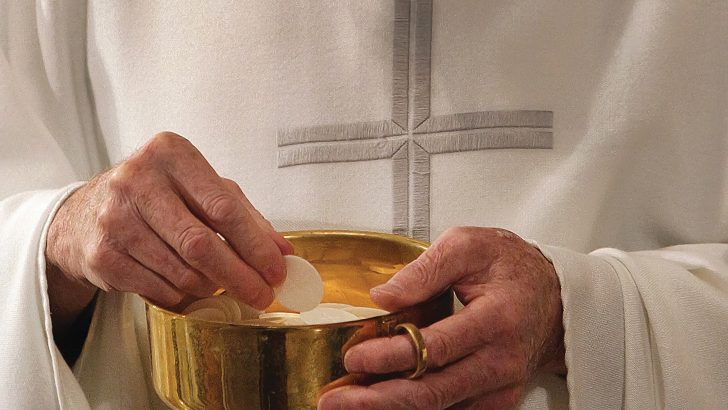Irish bishops ignoring the issue of Holy Communion for pro-abortion politicians would be a failure of leadership, writes David Quinn
In 1998, the Catholic bishops of Ireland, England and Wales issued a now mostly forgotten document called One Bread One Body. Its main subject matter was inter-communion, that is, whether or not non-Catholic Christians could receive the Eucharist when attending a Catholic church and whether Catholics can receive Communion in Protestant churches.
The document explained why this could not be so. It turned out to be very topical because the previous year there was a huge controversy when the then Archbishop of Dublin, Desmond Connell, objected after newly-elected president, Mary McAleese, received Communion in Christ Church cathedral in Dublin, one of the country’s main Anglican churches.
To this day, the issue of inter-communion remains controversial and in fact is one of the topics of the German synod. It may well be raised by the planned Irish synod.
Just last week, the American bishops were discussing at their latest quarterly meeting the issue of Communion, including who may or may not receive it. By a vote of three to one they agreed to draft a document examining the issue.
What has attracted almost all the media attention is the figure of President Joe Biden, a Mass-going Catholic who also happens to be a major supporter of abortion ‘rights’ in the United States. As with many politicians in Ireland, his position on the issue has ‘evolved’ down the years. Several decades ago, he backed abortion under only limited circumstances, but now he wants almost no restrictions whatever.
Upfront
Biden is quite upfront about his Catholic Faith, but obviously his ardent support for a very liberal abortion law presents the American hierarchy with a problem. If they say nothing about the matter then it can easily appear to other Catholics that supporting abortion is compatible with the Catholic Faith, when it clearly isn’t.
But if they decide to take a stand and say that politicians such as Joe Biden should be refused Communion, then there will be a major controversy and a backlash from many Catholics who will feel such an approach is too harsh. They might also believe it is incompatible with the approach favoured by Pope Francis with its emphasis on ‘mercy’ and ‘accompaniment’.
Coherence
There will be a section in the planned document on ‘eucharistic coherence’. This term first appeared in a statement issued by the bishops of Latin America in 2007 called the ‘Aparecida document’ which was signed by, among others, Pope Francis, while he was still archbishop of Buenos Aries in his native Argentina.
On this question it says: “We must adhere to ‘eucharistic coherence,’ that is, be conscious that they [i.e., legislators, heads of government and health professionals] cannot receive Holy Communion and at the same time act with deeds or words against the commandments, particularly when abortion, euthanasia, and other grave crimes against life and the family are encouraged.”
That is a powerful statement. The American bishops are wondering whether they should come up with something similar.
It is also something our own bishops should consider, especially in light of the abortion referendum of three years ago. Not to consider the matter, would be a failure of leadership, even if the matter is extremely controversial.
During that referendum, prominent politicians, who, like Mr Biden, are regular Mass-goers, campaigned for the repeal of the Eighth Amendment.
The Government also appears to favour euthanasia. Can Ireland’s bishops maintain their integrity and at the same time remain silent while self-professed Catholics promote the ‘right to die’?
Shortly after the abortion referendum, Bishop Kevin Doran went on radio and said he believed voting ‘yes’ was a sin if a Catholic “knew and intended abortion as the outcome”.
Under these circumstances, a Catholic would need to go to Confession before receiving Communion again.
The same would apply to every Catholic politician who voted for abortion, or worse, campaigned for it.
Statement
The American bishops might well produce a statement in the coming months on the matter of ‘eucharistic coherence’ similar to the one produced by their Latin American counterparts.
It might well tell Catholic politicians, doctors and others who actively support abortion and euthanasia that they should not present themselves for Communion until they begin to espouse pro-life positions again and have attended Confession.
However, this does not mean someone like President Biden will actually be refused Communion in practice because a document of the bishops’ conference is not binding on bishops individually. Ultimately, it will be up to each bishop to issue instructions for his own diocese. Each bishop might well leave it up to individual priests to decide.
In that case, it is extremely unlikely that Mr Biden will be refused Communion because he will ensure he attends a church which would not do so.
Here in Ireland, the bishops must give serious consideration to the issue of ‘eucharistic coherence’ and follow the lead of the Latin American bishops.
This would set out clearly that it is wrong for Catholic politicians to support laws and policies that attack the right-to-life and they should not present themselves for Communion.
In practice, few priests would actually refuse to give the Eucharist to such politicians, but the bishops need to try and draw a line somewhere, because not even attempting to do so lacks integrity and, to use that word again, ‘coherence’.


 David Quinn
David Quinn
